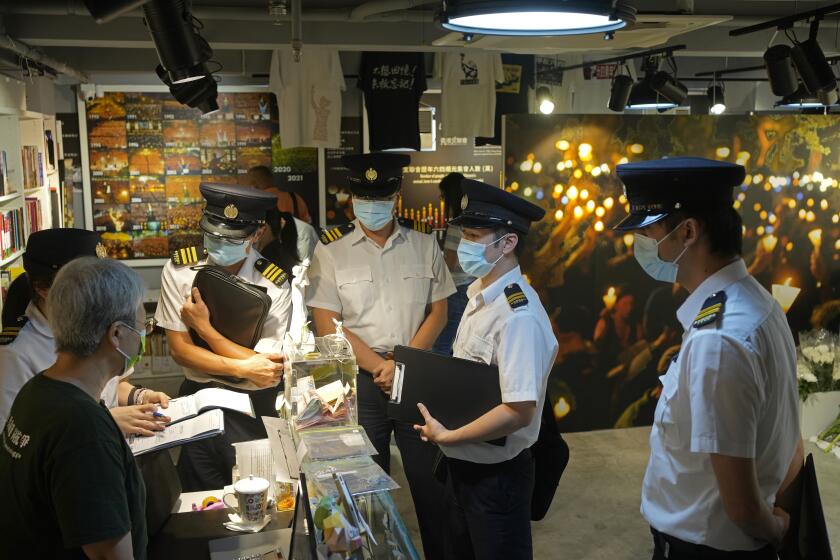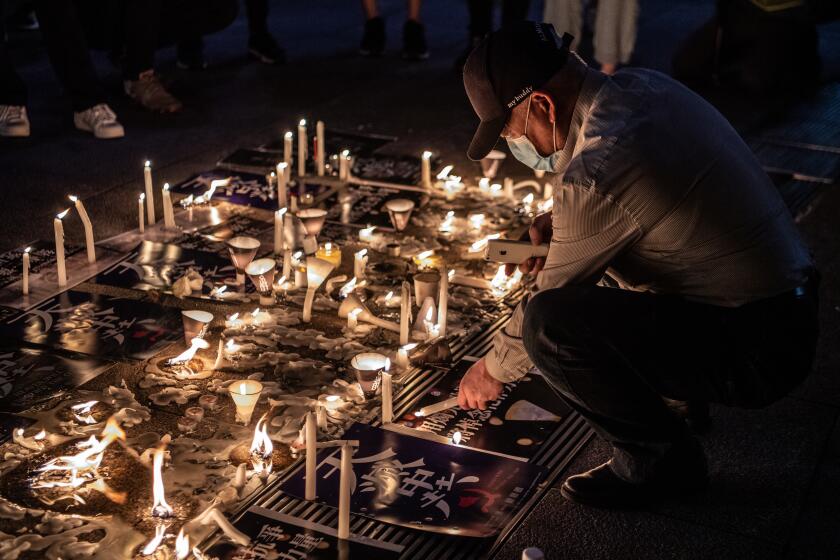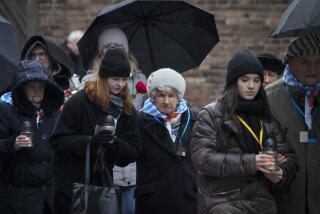Silence and heavy security in China and Hong Kong on 35th anniversary of Tiananmen crackdown

- Share via
BEIJING — Checkpoints and police vehicles were in place Tuesday at Beijing’s Tiananmen Square as China tried to silence the 35th anniversary of a bloody crackdown on pro-democracy protests. Hong Kong police swarmed a small group of people who tried to protest or commemorate as the effort extended beyond the mainland.
China has long quashed any public recognition of the 1989 military crackdown on months-long protests at the heart of its capital. An estimated 180,000 troops and police rolled in with tanks and armored vehicles and fired into crowds trying to block them from advancing on the student-led demonstration in the square.
Hundreds, if not thousands, are believed to have been killed in an overnight operation that ended the morning of June 4, 1989.
It was a turning point in modern Chinese history as Communist Party hard-liners embraced control instead of political reforms.
The economy boomed in the ensuing decades, turning a once-impoverished country into the world’s second largest economy, but societal controls have been further tightened since party leader Xi Jinping came to power in 2012.
Hong Kong’s lawmakers unanimously passed a new national security law that grants the government more power to quash dissent.
Across China, the anniversary remains a taboo subject that is heavily censored. Any mention on social media is quickly erased.
Life appeared as normal in Beijing on Tuesday, with tourists lining the streets leading to gates to Tiananmen Square and the Forbidden City, the former imperial palace across from it. The closest subway exit was closed, as was a viewing point atop Tiananmen Gate, according to a visitor registration website.
“As to the political disturbance that occurred in the late 1980s, the Chinese government has long had a clear conclusion,” Foreign Ministry spokesperson Mao Ning said without elaborating. Asked about Western government statements on the anniversary, she added, “We are firmly opposed to anyone using this as a pretext to attack and smear China and interfere in China’s internal affairs.”
Tiananmen Mothers, a group formed by families of the victims, made an online appeal to the Chinese government to publish the names and total number of those who died, grant compensation to the victims and their relatives and pursue legal accountability for those responsible.
“The June 4 tragedy is a historical tragedy that the Chinese government must face and explain to its people, and some people in the government at that time should be held legally responsible for the indiscriminate killing of innocents,” the group said in a letter signed by 114 relatives and published on its website, which is blocked in China.
A Hong Kong museum commemorating the massacre of pro-democracy protesters in China’s Tiananmen Square has closed just three days after opening.
Tiananmen memorials were also scrubbed out in Hong Kong — for years the only place in China where they could take place. A carnival organized by pro-Beijing groups was held Tuesday in a park that for decades was the site of a huge candlelight vigil marking the anniversary.
Hong Kong police officers were out in force. An elderly man was seen being taken away after holding up two handwritten posters. One read: “Remember 89! Mourn 64!” Hong Kong media said activist Alexandra Wong, popularly known as “Grandma Wong,” was also removed after she chanted slogans.
An AP journalist saw another woman taken away after being searched, and an online Hong Kong media outlet reported a fourth person taken in a police vehicle. In both cases it was unclear why.
“It’s different from the past,” said Hong Kong resident Keith Law. “Many people seem to act as if there’s nothing happening, including myself.”
After darkness fell, one person who lighted a candle and two others who turned on their smartphone lights were quickly cordoned off by police and questioned in three separate incidents outside the park. They were eventually released.
Hong Kong authorities have banned the annual Tiananmen Square massacre commemoration this year. But some are determined to remember — and resist.
“My heart hasn’t died yet,” said one, former vigil-goer Edward Yeung.
Rows of electronic candles lighted up the dozens of windows of the U.S. Consulate at night, and the British Consulate posted an image on the social media platform X of a hand holding a smartphone with its light on and the Roman numerals “VI IV,” a reference to June 4. Hong Kong is a former British colony.
Some Hong Kong residents remembered the event privately, running 6.4 kilometers on Monday or sharing Tiananmen-related content on social media.
A bookstore that displayed “35/5” on its window — a roundabout reference to the date of the crackdown as May 35 — wrote on Instagram that police officers were outside the shop for an hour Sunday and recorded the ID details of customers.
Hong Kong leader John Lee did not answer directly when asked Tuesday whether residents could publicly mourn the crackdown. He urged residents not to let down their guard against attempts to cause trouble.
“The threat to national security is real,” Lee said at a weekly briefing. “Such activities can happen all of a sudden, and different people may use different excuses to hide their intention.”
Increasing repression from Beijing has united two generations in Hong Kong, those whose lives pivoted in 1989 and those who weren’t even born then.
Commemorative events have grown overseas in response to the silencing of voices in Hong Kong. More than 100 people gathered in Washington to light candles Monday at the foot of a replica of a statue erected on the square during the 1989 protest — a woman holding a torch and known as the Goddess of Democracy.
“Chinese people cannot speak for themselves, so we must speak for them,” said political commentator Gordon Chang.
That sentiment was echoed in Taiwan, where people laid flowers and put electronic candles on the numbers 8964 — representing June 4, 1989 — on a banner spread on the ground in Taipei, the capital. Taiwan is a self-governing democratic island that China claims as its territory.
“As long as other places can still protest, we must continue to protest,” resident Leo Chiang said.
Moritsugu and Leung write for the Associated Press and reported from Beijing and Hong Kong, respectively. AP journalists Emily Wang Fujiyama in Beijing, Johnson Lai in Taipei and Didi Tang in Washington contributed to this report.
More to Read
Sign up for Essential California
The most important California stories and recommendations in your inbox every morning.
You may occasionally receive promotional content from the Los Angeles Times.













